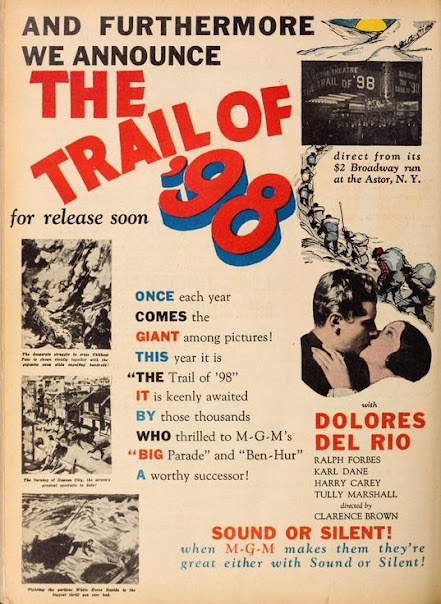
The picture gathers a cast of characters from across the country as word spreads via the newspapers of the gold strike. The most important ones are our hero, Larry (Ralph Forbes); the heroine, Berna (Dolores Del Rio), who's travelling with her blind grandfather; Salvation Jim (Tully Marshall), a Bible-spouting Old West-style prospecter; and Lars Petersen (Karl Dane), the stereotypical big Swede. Talking pictures weren't necessary for dialect humor; Lars says "Yumping Yimminy!" several times over on title cards. These and a few others survive the winnowing-out process on the trek through the wastes of Alaska -- a teenaged boy and Berna's old man are among the casualties -- to set up shop in Dawson. There the successful gold-striker Locasto (Harry Carey) lords over all he surveys; he returns from prospecting and orders a half-dozen plates of beans, just so he can leave them while he enjoys a steak. One key to Locasto's success, we learn, is claim jumping; our heroes are among his latest victims.
The first half, the trek to Dawson, has the most awesome and harrowing location shots and special effects, but there's a monotony to the long march that's only relieved when the movie actually grows a plot. Larry and Berna have hooked up but are ready to quit and head back to the U.S. when word of a fresh strike sparks a "stampede" of miners. Larry convinces a reluctant Berna to let him stay on to try his luck once more. Left alone, her resources running out, Berna is befriended by a woman (Doris Lloyd) who says she knows how it feels to be left behind to starve. She invites Berna to move in with her, and Berna's sudden enthusiasm for the idea may raise eyebrows. Her clinging gratitude is excessive, as if her feelings for her new friend involve something besides food. But just as Berna stretches out rapturously on her new bed, her arms spread as if to welcome whoever walks through the door, who should stroll in but Locasto? The woman has lured Berna here for him to rape, and Brown films the scene as if Harry Carey were Dracula; his back covers the fainting Berna and the screen goes dark.
Larry, Lars, Jim and a fourth partner have found gold after all. Lars and Jim rush to Dawson to register their claim, only to find out that Locasto has already claimed the land, thanks to some fancy bookkeeping. Lars goes berserk, hauling a clerk through the teller's window before destroying the entire office with his bare hands. With their resources running low at the camp, Larry's remaining partner decides to abandon him, taking their food with him but accidentally leaving behind the matches essential to his survival. He dies fantasizing of his triumphant return to his family with a suitcase full of money and gifts, while Larry retrieves the canned food on his own trip to Dawson. He arrives with a poke of gold dust to find Berna employed as one of Locasto's dance-hall girls. He shows her the gold and she slaps it away, screaming at Larry as the saloon patrons and employees all hit the floor to gather up the dust. It takes awhile for Larry to realize how Berna has reached such a state, and it bears mentioning here that Locasto had kicked Larry's ask quite convincingly earlier in the story. Naturally Larry wants a rematch now, but Brown makes us wait as Locasto arrogantly takes his time getting some valuable furniture, including an oil lamp, out of the way of the imminent mayhem. Harry Carey makes a great badass villain, by the way. Locasto gets in the first punch, but Larry's adventures have toughened him and now he gives as good as he takes. They move on to chair shots, and while these are typical flimsy movie chairs the fighters bleed from the blows as later barroom brawlers rarely would. Finally Larry gains the upper hand until Locasto pulls a pistol and opens fire. He shoots thrice and hits Larry at least once before our hero grabs that oil lamp and lobs it at the gunman, turning Locasto into a human torch. Our villain staggers through a corridor, tumbles off a balcony onto the dance floor and still manages to crawl a little as the crowd flees in terror while the whole building catches fire. Berna manages to drag Larry to safety as a whole block of buildings goes up in flames. They and Jim and Lars survive to earn another fortune at a more reasonable pace, vindicating the virtue of steady work.
In short, Trail of '98's epic aspirations are redeemed by the second half's robust pulp trash. It only comes to life when the protagonists have a compelling human antagonist instead of the impersonal elements. By the last half hour it's a snowball rolling downhill, and you get the impression that Brown and Metro could have made a perfectly fine action movie had they simply started in Dawson, without killing people for real. In sum, the epic pretensions of the first half weigh the film down, so that it's not as great a Yukon saga as Anthony Mann's The Far Country. Still, if you have the perseverance of the film's characters and make it all the way to Dawson, there's two-fisted fun to be had with this picture, if you're into that sort of thing.
No comments:
Post a Comment